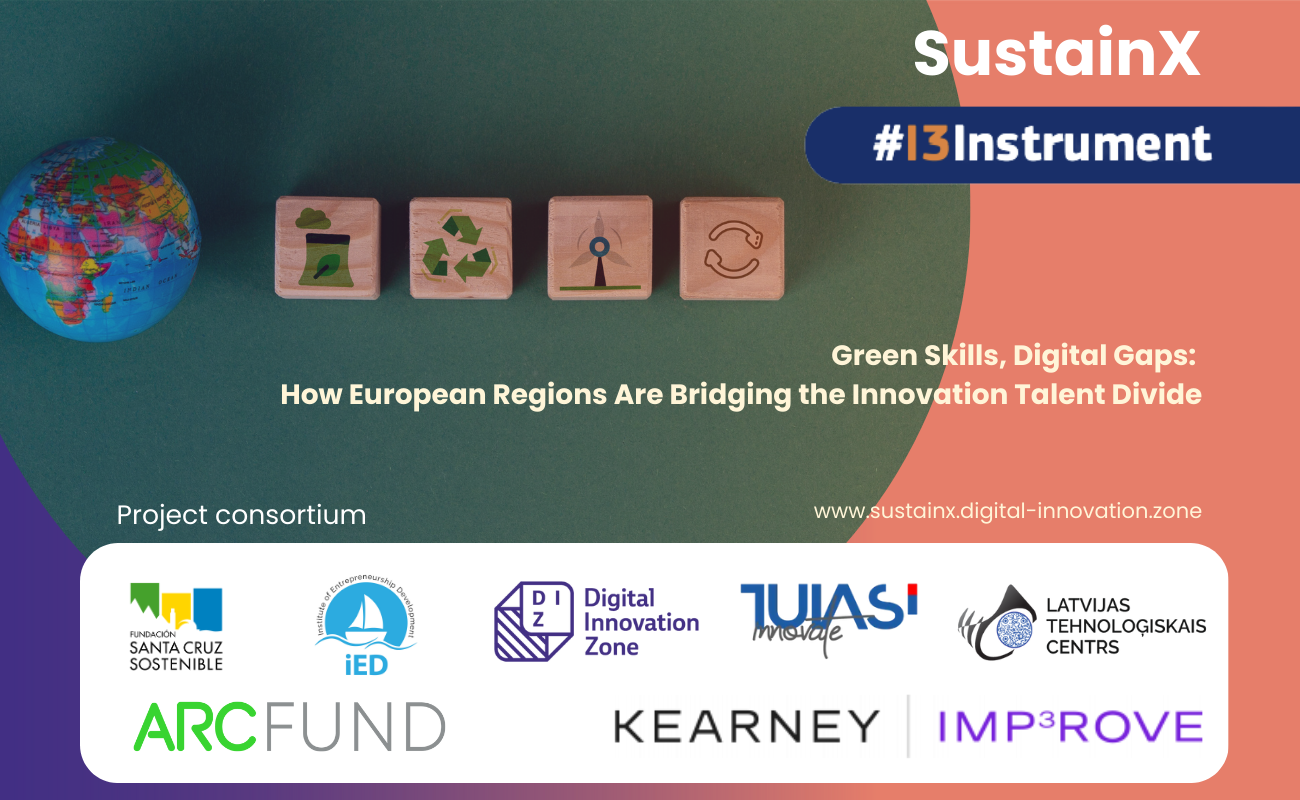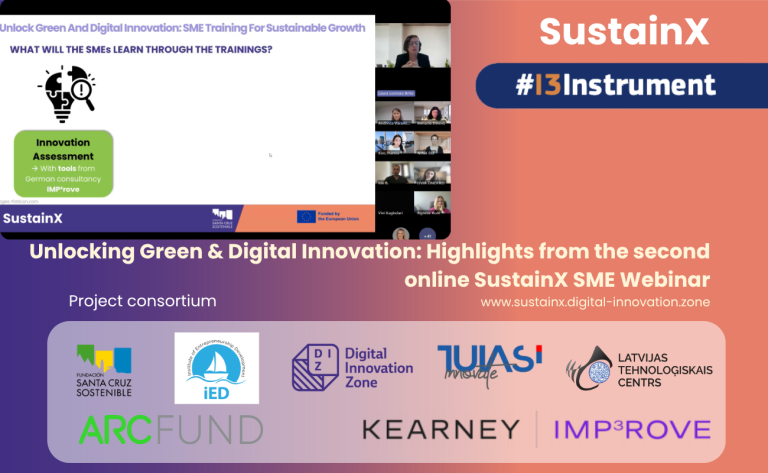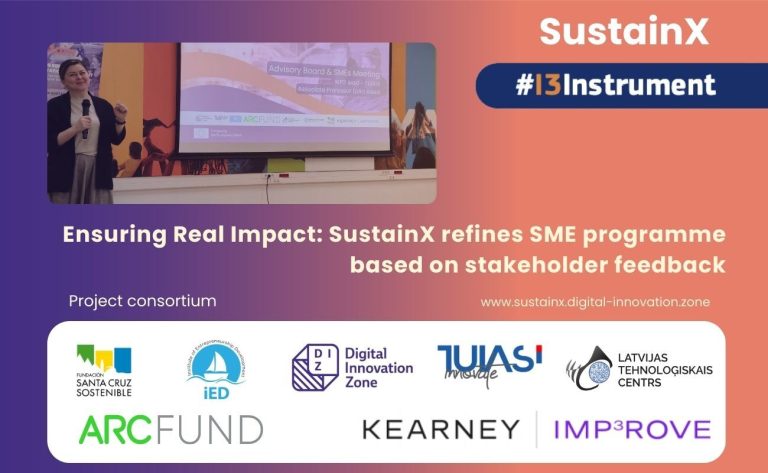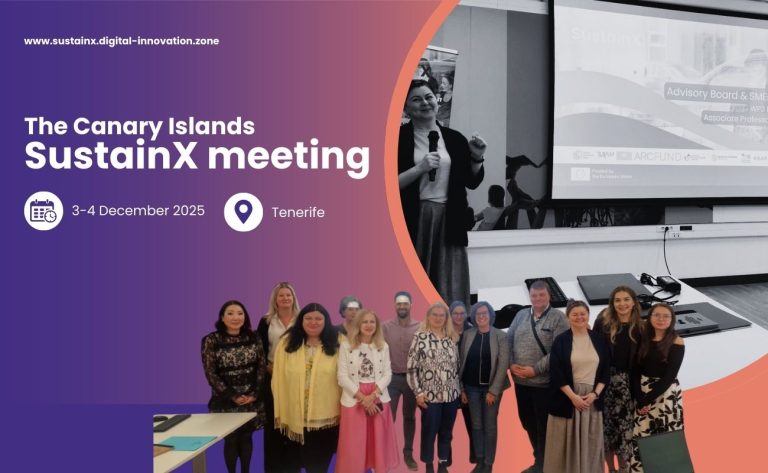In boardrooms and policy forums, innovation is often measured by patents, digital tools, or pilot programs. But in classrooms, factories, and community labs across Europe, a quieter truth is emerging: none of it works without people.
And not just any people—but those equipped with the right skills to navigate the complex, fast-moving demands of the green and digital transitions. Skills in data analytics, AI, circular economy, sustainable energy, and cross-sector collaboration. Skills that don’t just serve industry—but build resilience in communities.
Yet in many European regions, there’s a growing gap. A shortage of trained professionals. A brain drain of young talent. And SMEs that want to innovate, but don’t know where to begin.
This is where SustainX steps in—with a cross-border, hands-on response to one of the most pressing innovation challenges of our time: the talent divide.
The Problem: Innovation Without People Is Just a Plan
For all the policy progress, Europe’s regional innovation ecosystems still face a mismatch between ambition and capacity. Strategies like RIS3 outline where regions want to go. But who will take them there?
From rural municipalities to tech-savvy cities, the SustainX project partners are hearing the same thing: “We have the ideas, we just need the people.” People with green skills. People with digital know-how. People who can connect research with reality.
Latvia: From Pilot to Pipeline
In Latvia, SustainX partners have taken the challenge head-on. With a focused action plan grounded in RIS3 priorities, they’ve launched a training initiative to upskill over 150 professionals in high-demand areas like data analytics, smart energy, and circular economy design.
What makes the Latvian model stand out isn’t just the volume—it’s the precision. Each training aligns with regional strengths and gaps identified through stakeholder mapping, ensuring that new skills meet real SME needs. The outcome? A stronger talent pipeline ready to fuel innovation in agriculture, manufacturing, and green tech.
Romania: Embedding Digital in Everyday Business
In Romania, the Digital Innovation Zone (DIZ) isn’t just raising awareness about the digital economy—they’re embedding it into SME routines.
Their model is deeply personal: hands-on coaching for SMEs, digital maturity assessments, and tailored action plans. Beyond training, DIZ supports the formation of tech partnerships—helping local businesses integrate tools like cloud computing, IoT, and automation.
Meanwhile, TUIASI (Technical University of Iași) plays a complementary role, offering cutting-edge training on the innovation lifecycle. The university is working closely with SMEs and regional actors to translate research into prototypes, and prototypes into markets.
Together, they’re turning Romania’s RIS3 priorities into living, breathing ecosystems—where knowledge is put to work, and talent is homegrown.
Bulgaria: Training Meets Transformation
In Bulgaria, the challenge isn’t a lack of policy—it’s a lack of connectedness. That’s why ARC Fund, one of the country’s leading innovation intermediaries, is pairing training initiatives with advisory infrastructure.
On one end, they’re delivering capacity-building sessions for SMEs and innovation intermediaries. On the other, they’ve launched a national-level SME Innovation Helpdesk—a platform that guides entrepreneurs through the complexities of EU funding, S3 alignment, and innovation strategy.
This dual approach—learning and doing, simultaneously—is designed to create lasting capacity, especially in regions beyond Sofia where talent retention is most fragile.
Greece: Designing for Agility
iED (Institute of Entrepreneurship Development), based in Greece, is tackling the human capital gap with an emphasis on agility and adaptability.
Instead of rigid curricula, iED offers modular, fast-track programs in business model innovation, design thinking, and digital transformation—tools SMEs can apply immediately. Their support for RIS3 integration ensures that training isn’t theoretical, but always anchored to regional goals.
In a landscape where innovation windows open and close fast, iED’s flexible formats are helping Greek SMEs keep pace—and in some cases, lead.
Spain: Inclusion at the Core
In the Canary Islands, the team at Fundación Santa Cruz Sostenible brings a crucial lens to the skills conversation: inclusion.
Their work ensures that green and digital transitions aren’t just for urban centers or high-tech clusters. By linking innovation efforts with community-based training and local development, they’re making sure that no one is left behind. Women, youth, and underserved populations are actively included in programs that blend sustainability with entrepreneurship and digital literacy.
Their approach reminds us that skills aren’t just an economic asset—they’re a social right.
Germany: A Compass for Scaling What Works
While implementation happens locally, Germany plays a key role in knowledge transfer. SustainX draws from German partners’ expertise in:
- Innovation governance
- Monitoring and evaluation (M&E)
- Strategic foresight tools
- Dashboarding for S3 progress tracking
These tools are not imposed—they’re adapted and scaled through peer learning, allowing regions with different starting points to benefit from shared insights and tested approaches.
A Shared Vision: People-First Innovation
What unites these regional efforts is a shared belief: innovation is only as strong as the people who drive it.
That’s why SustainX isn’t only about green pilots or digital platforms—it’s about building the human infrastructure that allows innovation to thrive sustainably and equitably.
In the next decade, skills won’t just support innovation—they’ll define it. The regions that invest in people today are the ones that will lead tomorrow.
And thanks to SustainX, that future is being co-created right now—across borders, sectors, and communities.




